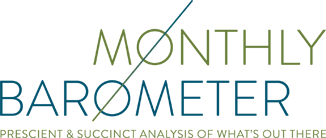Weekly Selections from Monthly Barometer
Weekly Selections from Monthly Barometer
-
Author : Thierry Malleret
Date : April 7, 2014

5 insightful op-eds or articles to help make sense of today’s world
Nouriel Roubini, “The Changing Face of Global Risk”
(Project Syndicate, March 31, 2014)
Nouriel thinks that the six main global risks of a year ago (Eurozone breakup, fiscal crisis in the US, public-debt crisis in Japan, deflation in advanced economies, war between Israel and Iran, and wider breakdown in the Middle East) have receded. Instead, he identifies the emergence of six new ones: (1) a Chinese hard-landing, (2) and (3) Fed policy mistakes, (4) EMs crises worsening, (5) “Cold War II”, (6) disputes in Asia.
http://www.project-syndicate.org/commentary/
Alix Spiegel, “So You Think You’re Smarter Than A CIA Agent”
(NPR, March 2, 2014)
This is a story about The Good Judgment Project (in which Emile Servan-Schreiber, a good friend of the Barometer, is involved): a 4-year research study financed by the US intelligence community that harnesses the wisdom of the crowd to forecast global events. Amazingly (or not?), the crowd predictions are often better than those made by intelligence analysts with access to classified information. Very promising and exciting, with far-reaching implications across industries!
http://www.npr.org/blogs/
Robert Kaplan, “Geopolitics at a Beijing Teahouse”
(The Globalist, April 1, 2014)
This is adapted from his latest book: “Asia’s Cauldron: The South China Sea and the End of a Stable Pacific”. Here, Kaplan makes a point that may sound trite but is in reality profoundly insightful (as it explains Crimea, Ukraine, brewing conflicts in Asia and so on): different worldviews are informed by different geographical points of reference. The same observation applies to experts in China: those who come from the global elite are normally very flexible (about geopolitical issues). Those who are in power tend to be less flexible. It is the opinion of the latter that holds sway.
http://www.theglobalist.com/geopolitics-at-a-beijing-teahouse/
Tom Chatfield, “Automated ethics”
(AEON, March 31, 2014)
A longish (but great!) article from a leading commentator on digital culture about the ethics of handing our decisions over to machines; and also about when external automation is a step too far. He addresses these issues through the lenses of what philosophers call the “trolley problem” and the Thomas Aquinas doctrine of double effect.
http://aeon.co/magazine/world-views/
“On Kahneman”
(Edge, March 27, 2014)
A collection of almost 30 essays to celebrate the 80th birthday of the psychologist who won the Nobel Prize in economics in 2002. People as different as Taleb, Nisbett, Thaler, Pinker, Sustein and many others explain how Kahneman’s work influenced their own, and what step made this possible. A fascinating read…
http://edge.org/conversation/on-kahneman
